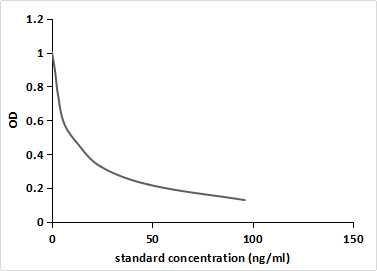Monoclonal Antibody to Epinephrine (EPI) 

Adrenaline
Overview
Properties
- Product No.MAA858Ge22
- Organism SpeciesPan-species (General) Same name, Different species.
- ApplicationsELISA, CLIA. / IHC-Fr, ICC, IP (predicted).
If the antibody is used in flow cytometry, please check FCM antibodies.
Research use only - DownloadInstruction Manual
- CategoryMetabolic pathwayInfection immunityNeuro scienceHormone metabolism
- SourceMonoclonal antibody preparation, Host Mouse
- Ig Isotype IgG2b Kappa, Clone Number C8
- PurificationProtein A + Protein G affinity chromatography
- LabelNone
- Immunogen CPA858Ge11-BSA Conjugated Epinephrine (EPI)
- Buffer Formulation0.01M PBS, pH7.4, containing 0.05% Proclin-300, 50% glycerol.
- TraitsLiquid, Concentration 1mg/ml
Sign into your account
Share a new citation as an author
Upload your experimental result
Review

Contact us
Please fill in the blank.
Specifity
The antibody is a mouse monoclonal antibody raised against EPI. It has been selected for its ability to recognize EPI in ELISA and CLIA
Usage
Immunohistochemistry: 5-20µg/mL;
Immunocytochemistry: 5-20µg/mL;
Optimal working dilutions must be determined by end user.
Storage
Store at 4°C for frequent use. Stored at -20°C in a manual defrost freezer for two year without detectable loss of activity. Avoid repeated freeze-thaw cycles.
Stability
The thermal stability is described by the loss rate. The loss rate was determined by accelerated thermal degradation test, that is, incubate the protein at 37°C for 48h, and no obvious degradation and precipitation were observed. The loss rate is less than 5% within the expiration date under appropriate storage condition.
Giveaways
Increment services
Citations
- METHODS AND REAGENTS FOR THE DIAGNOSIS, PREVENTION AND TREATMENT OF INSULIN RESISTANCEFPO:EO237136
- Glibenclamide attenuates myocardial injury by lipopolysaccharides in streptozotocin-induced diabetic micePubmed:Pmc4147163
- Study of baicalin on sympathoexcitation induced by myocardial ischemia via P2X3 receptor in superior cervical gangliaPubmed:25554221
- Catha edulis chewing effects on treatment of paranoid schizophrenic patientsPubMed: 25926735
- Ablation of Potassium-Chloride Cotransporter Type 3 (Kcc3) in Mouse Causes Multiple Cardiovascular Defects and Isosmotic PolyuriaPubmed:27166674
- Reduced lipolysis response to adipose afferent reflex involved in impaired activation of adrenoceptor-cAMP-PKA-hormone sensitive lipase pathway in obesitypubmed:27694818
- Non‐pharmacological interventions during childbirth for pain relief, anxiety, and neuroendocrine stress parameters: A randomized controlled trialPubmed:29512230
- Assessment of the TDCS Influence on Stress-Induced Disorders in Rats with Low Stress Sustainability and Endurance
- RFRP-3, the Mammalian Ortholog of GnIH, Is a Novel Modulator Involved in Food Intake and Glucose HomeostasisPubmed: 32328034
- Feeding induces cholesterol biosynthesis via the mTORC1–USP20–HMGCR axisPubmed: 33177714
- Blockade of adrenergic β‐receptor activation through local delivery of propranolol from a 3D collagen/polyvinyl alcohol/hydroxyapatite scaffold promotes bone repair …
- Anti-stress activity of some plants extracts of the North Caucasus flora
- Adipose tissue lipolysis is regulated by PAQR11 via altering protein stability of phosphodiesterase 4D33549845
- O-GlcNAc/Akt pathway regulates glucose metabolism and reduces apoptosis in liver of piglets with acute cold stress33651993
- Expression of LHCGR (Luteinizing Hormone/Chorionic Gonadotrophin Receptor) in Pheochromocytomas Unveils an Endocrine Mechanism Connecting Pregnancy …Pubmed:35189708









